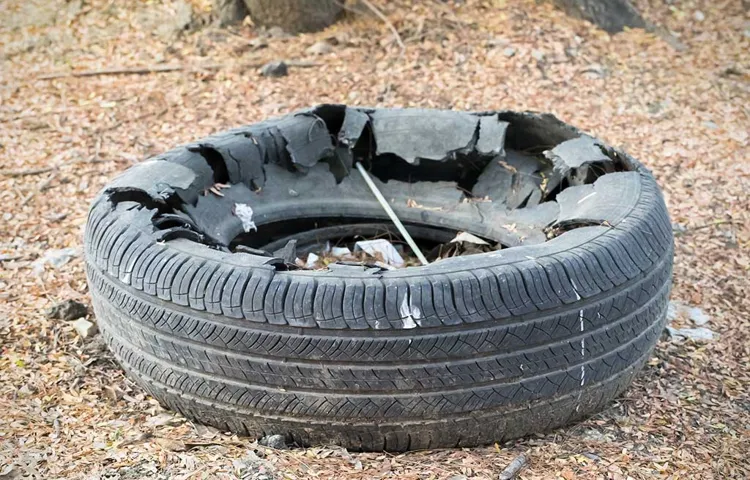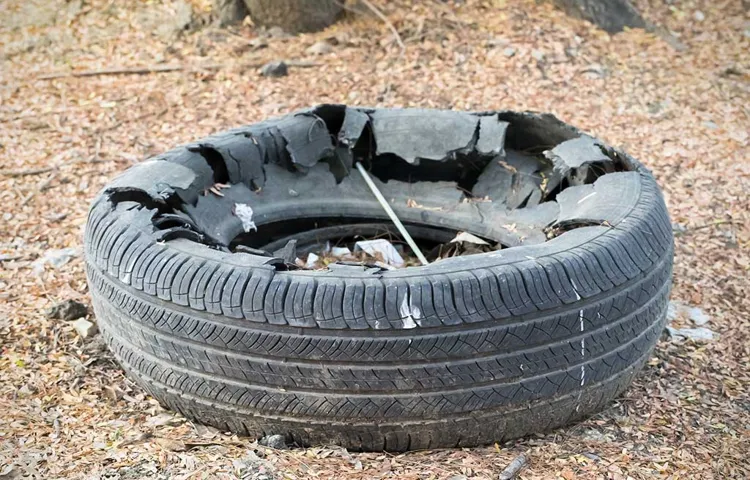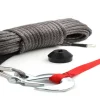Have you ever experienced a tire blowout while driving on the highway? It’s a scary and stressful situation that can happen to anyone. When a tire loses all of its air pressure suddenly, it can cause the vehicle to swerve and lose control, increasing the risk of a severe accident. At highway speeds, the impact of a tire blowout can be devastating.
The sudden loss of control can cause the driver to overcorrect, making the situation worse. The car can spin out of control or veer off the road, risking harm to both the driver and passengers in the vehicle and other road users. To prevent a tire blowout while driving on the highway, it’s crucial to maintain proper tire pressure and check your vehicle before hitting the road.
It’s also essential to drive carefully and avoid overloading your car. In the unfortunate event of a tire blowout, start by staying calm and keeping a firm grip on the steering wheel. Then, gradually slow down the car and move it to a safe spot away from the road.
In summary, a tire blowout on the highway can have severe consequences. Taking precautions and being prepared can help to prevent this from happening. Remember to stay calm in case of a tire blowout and focus on reaching a safe place.
Be alert, drive safely, and always check your car before hitting the road.
Table of Contents
Loss of Control
If you’ve ever experienced a tire blowout while driving at highway speed, you know just how scary and disorienting it can be. A tire blowout happens suddenly and without warning, causing your car to vibrate and shake before you lose control. When a tire blows out, it can lead to a loss of control that puts both you and your passengers in danger.
You may find it difficult to steer or brake, and the car may drift to one side or the other. This is because the blown tire affects the car’s stability and causes it to tilt on one side. Moreover, the sudden burst of air can cause the car to jerk, making it harder to stay composed and follow the rules of the road.
As a result, it’s essential to keep your cool and remain calm should you ever experience a tire blowout. Proper maintenance of your tires can help prevent this situation from happening and keep you safe on the road.
Vehicle swerves abruptly
If you’ve ever been in a car accident or witnessed one, you know how quickly things can go wrong. Sometimes, a vehicle swerves abruptly causing the driver to lose control of the car. This can be a terrifying experience, with potentially deadly consequences.
Loss of control can happen for a number of reasons, including distracted driving, speeding, or mechanical failure. It’s important to always stay focused when you’re behind the wheel and to be aware of your surroundings. If you notice your vehicle swerving, take your foot off the accelerator and try to regain control slowly.
Don’t hit the brakes or make any sudden movements that could cause you to spin out of control. Remember, it’s better to arrive at your destination a few minutes late than to risk your life and the lives of others on the road. Stay safe out there!

Driver struggles to steer the vehicle
Have you ever experienced being unable to steer your vehicle while driving? It’s a scary and dangerous situation that can happen to anyone. This loss of control can occur due to various reasons such as a malfunctioning steering system, slippery road conditions, or even distracted driving. In any case, losing control of your vehicle can lead to serious accidents and injuries.
As a driver, it’s important to be alert and responsive to any changes in your vehicle’s performance. Don’t ignore any warning signs such as strange noises or vibrations coming from your car. Always stay focused and keep both hands on the wheel to maintain control of your vehicle.
Remember, safety should be your top priority when driving, and preventing a loss of control is key to avoiding accidents on the road.
Potential for a rollover accident
Loss of Control When driving, one of the scariest things to experience is a loss of control. Not only is it terrifying, but it can also lead to a rollover accident. A rollover accident occurs when a vehicle flips onto its side or roof, and can be caused by a variety of factors, including sudden swerving, overcorrecting, or driving too fast for the road conditions.
In many cases, a loss of control occurs due to human error, such as distracted driving, drunk driving, or fatigue. However, vehicle defects can also play a role in rollover accidents, such as faulty brakes, tires, or suspension systems. To prevent a loss of control and potential rollover accident, it is important to stay alert and focused on the road, follow posted speed limits and traffic rules, and keep up with regular vehicle maintenance.
By taking these steps, we can reduce the risk of a devastating accident and keep ourselves and others safe on the road.
Damage to the Tire and Vehicle
When a tire blows out at highway speed, it can lead to both damage to the tire and the vehicle. The sudden loss of air pressure can cause the driver to lose control of the vehicle, potentially resulting in an accident. The blown-out tire itself can also cause damage to other components of the vehicle such as the wheel well, suspension system, and even the body of the car.
The force of a blowout can also cause the vehicle to swerve uncontrollably, leading to damage to other cars on the road or even causing a multi-car collision. In addition to physical damage, tire blowouts can also result in financial losses due to repair and replacement costs. It’s important to check tire pressure regularly and to replace worn tires in order to prevent potentially dangerous blowouts on the road.
Tire disintegrates and shreds on the road surface
When a tire disintegrates and shreds on the road surface, it can cause significant damage to both the tire and the vehicle. This type of situation often occurs due to extreme weather conditions, such as excessive heat or cold, as well as wear and tear from prolonged use. The sudden failure of a tire can lead to loss of control of the vehicle, putting both the driver and passengers at risk.
In addition to the safety concerns, there is also the matter of the financial impact on the driver. Not only will they have to replace the damaged tire, but they may also have to cover the cost of any additional repairs that are needed. To avoid this type of situation, it is important to regularly inspect and maintain your tires, including checking the air pressure, tread depth, and overall condition.
By taking these precautions, you can reduce the risk of a tire disintegrating and shredding on the road, keeping yourself and your passengers safe while also avoiding unnecessary expenses.
Vehicle may sustain damage to the rims, fenders, and suspension
When it comes to driving, a flat tire can be a frustrating experience. Not only does it slow you down, but it can also cause damage to the vehicle. In the case of a nail in the tire, for example, it can puncture the rubber and cause the tire to deflate.
While this may not seem like a huge issue at first glance, it can lead to damage to the rims, fenders, and suspension of the vehicle. Driving on a flat tire can cause the rim to rub against the road, which can lead to scratches and dents. Additionally, the weight of the vehicle on the flat tire can cause stress on the suspension, which can lead to serious damage over time.
If you suspect that you have a flat tire, it is important to pull over as soon as it is safe to do so and assess the damage. By taking care of it promptly, you can avoid further damage to your vehicle and ensure your safety on the road. So, keep an eye out for any signs of a flat tire and take care of it as soon as possible to avoid any issues down the line.
Expensive repairs or replacement of damaged parts
When it comes to driving, one of the biggest concerns is the possibility of damaging the vehicle or its parts. One of the most commonly damaged components is the tire, which can be expensive to replace or repair. Tires are essential to a vehicle’s functionality and can greatly impact its safety.
A damaged tire can lead to a blowout or loss of control, which can cause serious accidents. Ensuring that tires are properly inflated, rotated, and aligned can help prevent damage and prolong their lifespan. However, sometimes accidents are unavoidable, and if a tire is damaged, it’s important to address the issue as soon as possible to avoid further damage to the vehicle.
Keeping an eye on tires and addressing any damage early on can save you money in potential repairs or replacements. So, make it a priority to check your tires regularly and take immediate action if any issues arise.
Risk of a Crash or Collision
Have you ever wondered what happens when a tire blows out at highway speed? It can be a terrifying experience, and the consequences can be severe. When a tire suddenly bursts on the highway, it can cause a sudden loss of control of the vehicle. This can result in a crash or collision with other vehicles on the road.
The initial shock of the blowout can be disorienting and can cause the driver to overcorrect and veer off the road, leading to a rollover or collision with other objects on the side of the road. The risk of a blowout can be reduced by keeping your tires properly inflated and maintaining their tread depth. Regular inspections and prompt replacement of worn tires can also help reduce the likelihood of a blowout.
Remember, the safety of yourself and others on the road depends on your vehicle’s maintenance, so don’t neglect it.
Other drivers can get involved in a collision or pile-up
When you’re behind the wheel of a car, it’s important to be aware of the potential risks of a crash or collision. One major factor that can increase the likelihood of an accident is the behavior of other drivers on the road. Even if you’re driving safely and following all traffic laws, another driver could make a mistake or act recklessly, putting you in harm’s way.
For example, if a driver runs a red light or fails to yield, they could collide with your vehicle. Additionally, if there’s a pile-up on the freeway or a multi-car accident, you could become involved simply because you happen to be in the wrong place at the wrong time. While you can’t control the actions of other drivers, you can take steps to minimize your risk.
Always remain alert and focused behind the wheel, and try to stay a safe distance away from other cars on the road. By doing so, you can reduce your chances of being involved in a collision or pile-up and ensure that you and your passengers arrive at your destination safely.
Vehicle could hit roadside obstacles or barriers
Driving can be a dangerous task, especially when there are roadside obstacles or barriers that could cause a collision or crash. These obstacles can range from curbs, guardrails, to trees or even pedestrians. They can cause severe damage to the vehicle and, more importantly, to the driver and passengers involved in the accident.
The risk of a crash or collision increases significantly when the driver is distracted, tired, or intoxicated. It is always important to remain attentive to the road and avoid any possible distractions to reduce the likelihood of a collision. Drivers should also make sure to keep a safe distance from the car in front of them to avoid abrupt collisions.
Additionally, it is vital to keep the vehicle in good condition and ensure that the brakes, tires, and other components are functioning correctly. Being cautious and responsible can make all the difference in avoiding a potentially fatal crash or collision. Remember, it’s not only about your safety, but also that of those around you.
Steps to Prevent a Tire Blowout on the Highway
When a tire blows out at highway speed, it can be a frightening experience that can cause accidents, injuries, or worse. Some of the common things that can happen include losing control of the vehicle, swerving off the road, and even flipping over in severe cases. To prevent a tire blowout on the highway, there are several steps you can take.
Firstly, make sure your tires are properly inflated, and check them regularly. Secondly, replace your tires when they become worn or damaged, and consider using high-quality tires for better performance. Thirdly, avoid overloading your vehicle, which can put extra stress on your tires and lead to blowouts.
Lastly, drive at a safe speed and avoid sudden maneuvers, which can put extra stress on your tires and cause them to fail. By following these steps, you can reduce your risk of experiencing a tire blowout on the highway and keep yourself and others safe.
Check tire pressure regularly
One of the key steps to prevent a tire blowout on the highway is to check your tire pressure regularly. Low tire pressure is one of the most common causes of blowouts, as it can cause extra stress on the tires and make them more susceptible to failure. To ensure your tires are properly inflated, use a tire pressure gauge to check them at least once a month.
Keep in mind that overinflated tires can also be dangerous, so be sure to follow the manufacturer’s recommendations for your specific vehicle. Checking your tire pressure can also improve your vehicle’s fuel efficiency and prolong the life of your tires, so it’s a win-win situation. Don’t risk a blowout on the highway – take a few minutes each month to check your tire pressure and avoid potential dangers on the road.
Replace worn-out or damaged tires
Replacing worn-out or damaged tires is an essential step to prevent a tire blowout on the highway. Tires are an integral part of your vehicle, and they need proper attention and maintenance to ensure safe driving on the road. Before hitting the highway, it’s crucial to check your tires regularly for any signs of wear and tear.
Driving with worn-out or damaged tires increases the risk of a blowout, which can cause an accident and put your life in danger. Therefore, it’s recommended to replace your tires if you notice any bulges, cracks, or other significant signs of damage. Additionally, it’s essential to check the tread depth of your tires regularly.
The tread on your tires is what provides traction, and if it’s worn down, it can lead to skids and less control on the road. Therefore, make sure to replace your tires when the tread depth is below 2/32 of an inch to ensure your safety on the highway. Remember, it only takes one tire blowout to cause a catastrophic accident, so take the necessary precautions and keep your vehicle’s tires in excellent condition.
Avoid overloading the vehicle
Preventing a tire blowout on the highway is vital for your safety and the safety of those around you. One of the best ways to reduce the risk of a blowout is by avoiding overloading the vehicle. Before hitting the road, make sure to check the manufacturer’s recommended weight limit for your car and stick to it.
Overloading the vehicle can cause excessive strain on your tires and lead to a blowout. Besides, make sure to distribute the weight of your cargo evenly to reduce the strain on any one tire. In addition, regularly inspect your tires for damage or wear and tear and replace them when necessary.
A damaged or worn-out tire is more prone to blowouts than a healthy tire. In conclusion, preventing a tire blowout is all about taking proactive measures and being responsible. Don’t overload your vehicle, inspect your tires regularly, and replace them when needed.
By following these simple steps, you’ll significantly reduce the risk of a tire blowout on the highway, keeping you and your loved ones safe.
Drive at moderate speeds and be cautious on turns
Preventing a tire blowout while driving on the highway is crucial for your safety and the safety of other drivers on the road. One of the best ways to avoid a tire blowout is to drive at moderate speeds and be cautious on turns. While it can be tempting to speed down the highway, maintaining a steady pace can help prevent excess heat buildup in your tires.
Additionally, slowing down before turns can reduce the strain on your tires and prevent them from wearing out too quickly. Remember to also check your tire pressure regularly and inspect your tires for any signs of wear or damage before starting your trip. By taking these steps, you can decrease the risk of having a tire blowout on the highway, ensuring a smoother and safer journey.
Conclusion
When a tire blows out at highway speed, it’s like winning the lottery – except instead of a monetary prize, you’ve just won a free adrenaline rush and a heart-pumping challenge to keep control of your vehicle. But unlike the lottery, this is not a game of chance or luck – it’s all about proper maintenance, safe driving, and quick thinking in case of emergencies. So, don’t leave your safety to fate – keep your tires in good shape, keep your eyes on the road, and keep your cool in unexpected situations.
Trust us, it’s a much better feeling than winning the lottery.”
FAQs
What causes a tire blowout at highway speed?
A tire blowout at highway speed can be caused by several factors such as underinflation, overloading, or tire damage.
How can I prevent a tire blowout while driving on the highway?
You can prevent a tire blowout by regularly checking your tire pressure, avoiding overloading your vehicle, and inspecting your tires for any damages.
What are the signs of an impending tire blowout?
Some of the signs of an impending tire blowout include vibrations while driving, uneven tread wear, and cracks or bulges on the tire sidewall.
How should I react when my tire blows out at highway speed?
When a tire blows out at highway speed, it is important to stay calm, keep your vehicle steady, and slowly steer to the side of the road.
Can a tire blowout be fatal?
Yes, a tire blowout can be fatal if it causes a loss of control of the vehicle or leads to a serious accident.
How often should I replace my tires to prevent blowouts?
It is recommended to replace your tires every 6 years, or sooner if there is visible damage, to prevent tire blowouts.
What should I do if I suspect my tire is damaged or worn out?
If you suspect your tire is damaged or worn out, you should have it inspected by a professional and possibly replace it to ensure your safety on the road.



